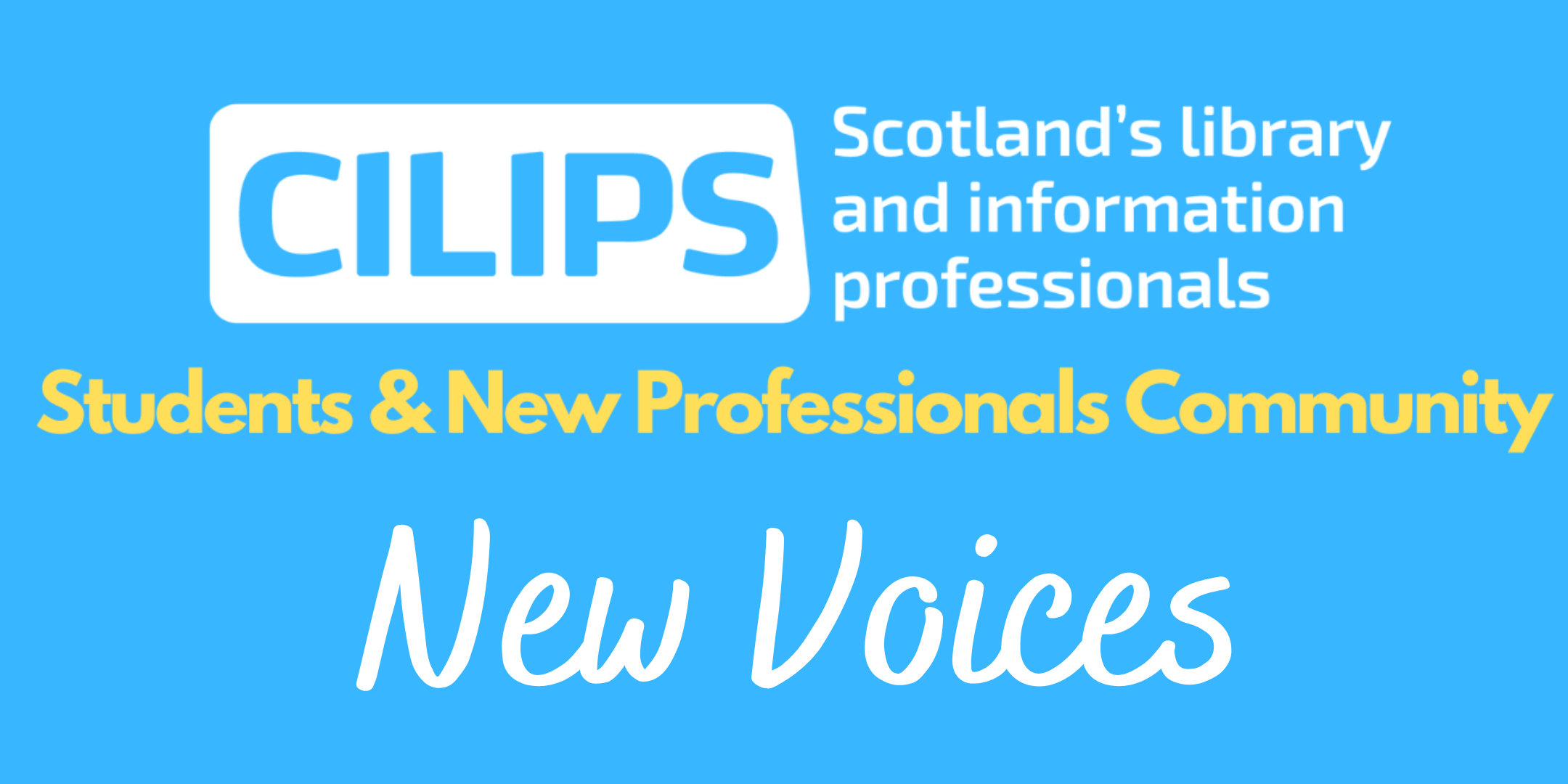New Voices RGU Student Series 2024 – Mara Carron
Category: Blog, New Voices, RGU Student Series 2024

In the 2024 Student Series for the New Voices blog, CILIPS Students & New Professionals Community will be sharing the views of Robert Gordon University students from the MSc in Information and Library Studies.
With special thanks to Dr Konstantina Martzoukou, Teaching Excellence Fellow and Associate Professor, for organising these thought-provoking contributions.
 Today’s blog post author is Mara Carron. Mara is Italian, living and working in Limerick (Ireland) as a library assistant at Limerick City Library. She has a background in History and conservation of cultural heritage, and she is currently pursuing her MSc in Information and Library Studies at RGU as a part-time, online student. Mara has a soft spot for visual arts and all things innovative and creative, as she thinks they have the power to enhance how we experience the world around us.
Today’s blog post author is Mara Carron. Mara is Italian, living and working in Limerick (Ireland) as a library assistant at Limerick City Library. She has a background in History and conservation of cultural heritage, and she is currently pursuing her MSc in Information and Library Studies at RGU as a part-time, online student. Mara has a soft spot for visual arts and all things innovative and creative, as she thinks they have the power to enhance how we experience the world around us.
Trust the evidence of our eyes in the generative artificial intelligence era.

Figure 1. Image generated using Stable Diffusion from the prompt “Northern Lights above the city of Venice, Italy”.
I was texting with my sister when she shared a video she stumbled upon on Facebook. The video showed the breath-taking Northern Lights near our parents’ home in the north of Italy. My initial scepticism kicked in because witnessing the Northern Lights from Italy is an extremely rare and nearly impossible occurrence. Could have that been the magic of AI, weaving a spectacular soon deceptive sequence of images through tools like deepfakes or advanced editing?
Generative Artificial Intelligence tools have become a staple in our daily lives, shaping the way we interact with information and content (and that’s where my scepticism originated from) but in my case the video turned out to be genuine and the Northern Lights were really visible throughout the skies of Europe and as far south as Italy due to a major geomagnetic storm that occurred last 6th November 2023. However, as hard as it was to believe it my moment of doubt prompted me a realisation: the subtle infiltration of AI into our daily lives makes it more and more difficult to distinguish between fiction and reality.
Spanning from text-to-image generation to audio synthesis, these tools present a multitude of possibilities along with challenges that demand an informed approach.
Understanding Information Literacy in the AI Era
Before diving into the challenges and opportunities posed by generative AI tools, it’s essential to establish the significance of information literacy. Information literacy is defined as ‘the ability to think critically and make balanced judgements about any information we find and use. It empowers us as citizens to develop informed views and to engage fully with society.’ (CILIP 2018).
In our daily life, information literacy is indispensable, it provides individuals with abilities to navigate an information-rich world and It promotes ethical behaviour in online activities, emphasizing skills such as security awareness, critical thinking to prevent scams and frauds, mindful information use and share, privacy, and understanding digital footprints.
In the context of generative AI these skills become paramount, cause tools like ChatGPT and Google Bard, among others, have the potential to reshape how we sound and look and how we interact with information and content with improved outcomes across different areas from personalized experiences to creating content or analysing data, however, this transformative power does not come without its challenges. The rise of deepfakes, which leverage deep learning algorithms and neural networks to generate convincing videos, poses a significant threat by blurring the lines between reality and artificiality. Unexpectedly, the appeal of deepfakes is woven into their capacity to provide entertainment, captivating individuals as deception, to a certain degree, evolve into amusement. Even though they can be used for positive purposes, such as film production, entertainment, and gaming, they are still widely applied for harmful purposes and too often used to damage the reputation of people with face swapping or to shape public opinion, thus seriously threatening stability, and social trust.
AI Literacy and the role of information professionals
IFLA’ Statement on Libraries and Artificial Intelligence acknowledges that people should be able to benefit from AI applications without falling victim to potential harm in both public and private spheres: misinformation, privacy breaches, and biases embedded in deepfakes underline the urgency for information professionals to equip individuals with the tools to discern reality and AI generated content.
Moreover, as generative AI tools continue to evolve, information literacy demands a more dynamic adaptation. Information professionals must actively acquire novel competencies to effectively support AI literacy and ensure that everyone possesses the skills to make informed decisions about AI use.
References
ANSA.IT, 2023. L’aurora boreale sul Nord Italia, le immagini delle webcam. Il rarissimo fenomeno ripreso ad Auronzo di Cadore e nel Varesotto. [Facebook]. 6 November 2023. Available from: www.facebook.com/watch/?v=1754821881616558&ref=sharin [Accessed 24 January 2024].
CILIP, 2018. CILIP definition of information literacy. [online]. Available from: www.cilip.org.uk/news/421972/What-is-information-literacy.htm [Accessed 24 October 2024]
GIATTINO, C., MATHIEU, E., SAMBORSKA, V. and ROSER, M., 2023. Artificial Intelligence. [online]. Available from https://ourworldindata.org/artificial-intelligence [Accessed: 24 Jenuary 2024]
INTERNATIONAL FEDERATION OF LIBRARY ASSOCIATIONS AND INSTITUTIONS, 2020. IFLA Statement on Libraries and Artificial Intelligence. [online]. International Federation of Library Associations and Institutions. Available from https://repository.ifla.org/handle/123456789/1646
[Accessed 24 January 2024].
SHIN, S.Y. and LEE, J., 2022. The effect of deepfake video on news credibility and corrective influence of cost-based knowledge about deepfakes. Digital Journalism, 10(3), pp. 412-432.